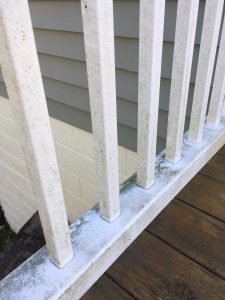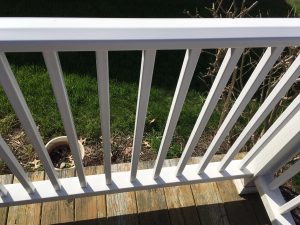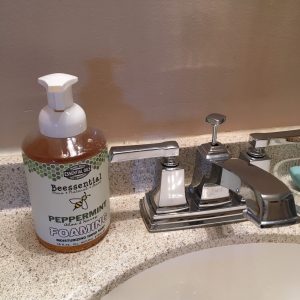“After years of wanting to thoroughly clean my house but lacking the time, this week I discovered that wasn’t the reason.” (Facebook meme from Wititudes) I’ve been wiping down bathroom surfaces with disinfecting wipes and decided that today I would do a more thorough cleaning. I pulled the trash can out to sweep and decided that the grime on the wall and dust in the corners needed to go. Dave assisted with that while he was taking a little break.
On our deck this afternoon, I crocheted, read, and cleaned. Our white PVC deck railing was neglected last summer, and I was ready to tackle the two-year build-up of dirt and algae, one small section at a time.

Clematis is green and growing along the dirty railing.

The stuff wipes off pretty easily, but I have to squat down to do it.

The section I did today. Railing is clean. Deck is not clean.
As I worked, I began to think about being clean. We’re working hard at it these days, washing hands often to avoid coronavirus infection, realizing that as we go about our day, we don’t stay clean for very long.

I recommend Beessential Foaming Hand Soap from Lehman’s Hardware in Kidron, Ohio.
Without changing topics, let me point out that we’re in the middle of Holy Week with Good Friday approaching. Sitting down to write, I searched the word clean on Biblegateway.com and found 176 verses in the Bible, most of them in the Old Testament, are related to clean practices. 182 verses mention the word unclean. God’s chosen people, the Israelites, were given strict instructions regarding consumption and sacrifice of clean animals, as well as how to be personally clean. Cleansing rituals needed to be repeated over and over, demonstrating obedience to God.
Nevertheless, the writer of Proverbs 20:9, understanding that cleanliness is not just skin deep, asked,
Who can say, “I have kept my heart pure; I am clean and without sin?”
Every person experiences a guilty conscience, for all have sinned and fallen short of God’s glory. Even King David, described as a man after God’s own heart, broke most of the 10 Commandments. When he realized that his sin grieved God, he was grieved. David admitted his sin to God, asking for cleansing forgiveness that would restore his relationship with God. His prayer in Psalm 51 pleads,
Wash away all my iniquity and cleanse me from my sin.
As I scrolled through the search results, God’s words given to his unfaithful people through the prophet Jeremiah, stunned me.
Although you wash yourself with soap
and use an abundance of cleansing powder,
the stain of your guilt is still before me,”
declares the Sovereign Lord. (Jeremiah 2:22)
The turning point in history finally came when God sent His own Son into the world to be the perfect remedy for our sinful condition. Jesus lived a perfect, sinless life and then traded that righteousness for the punishment that we deserved. A good Friday, indeed. Paul wrote to the early church in Ephesus,
Christ loved the church and gave himself up for her to make her holy, cleansing her by the washing with water through the word, and to present her to himself as a radiant church, without stain or wrinkle or any other blemish, but holy and blameless. (Ephesians 5:24-27)
Whoever believes this and, like David, confesses their sin, asking for God’s forgiveness and turning from their ways, can enjoy the peace that comes from a clean conscience. Hebrews 9:13-14 says,
The blood of goats and bulls and the ashes of a heifer sprinkled on those who are ceremonially unclean sanctify them so that they are outwardly clean. How much more, then, will the blood of Christ, who through the eternal Spirit offered himself unblemished to God, cleanse our consciences from acts that lead to death, so that we may serve the living God!
